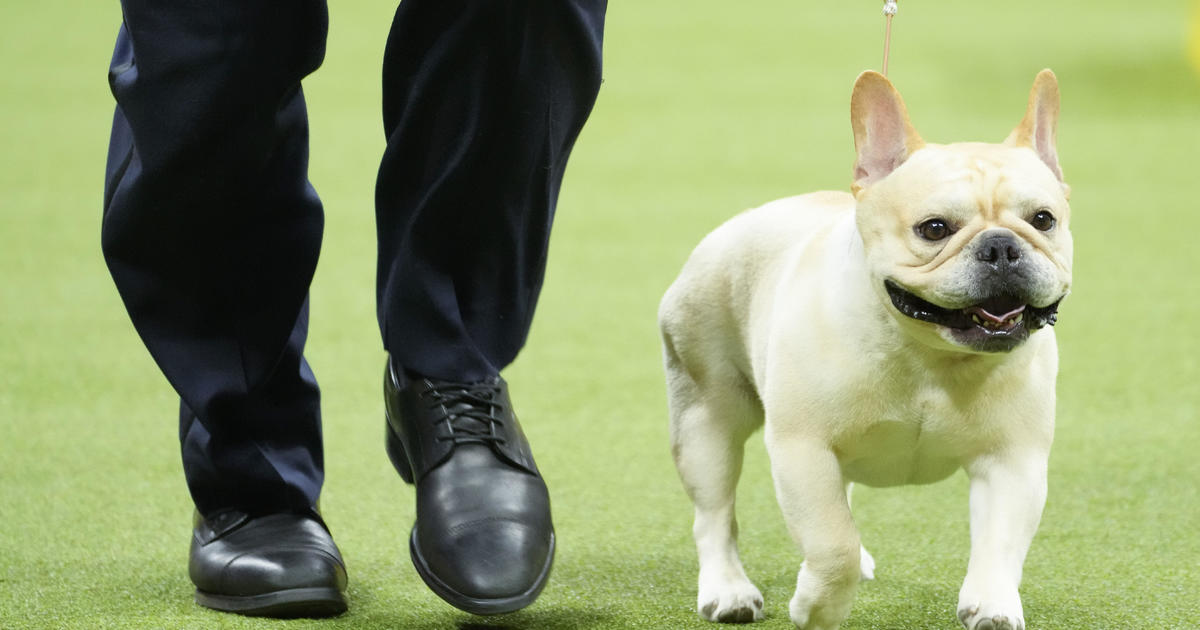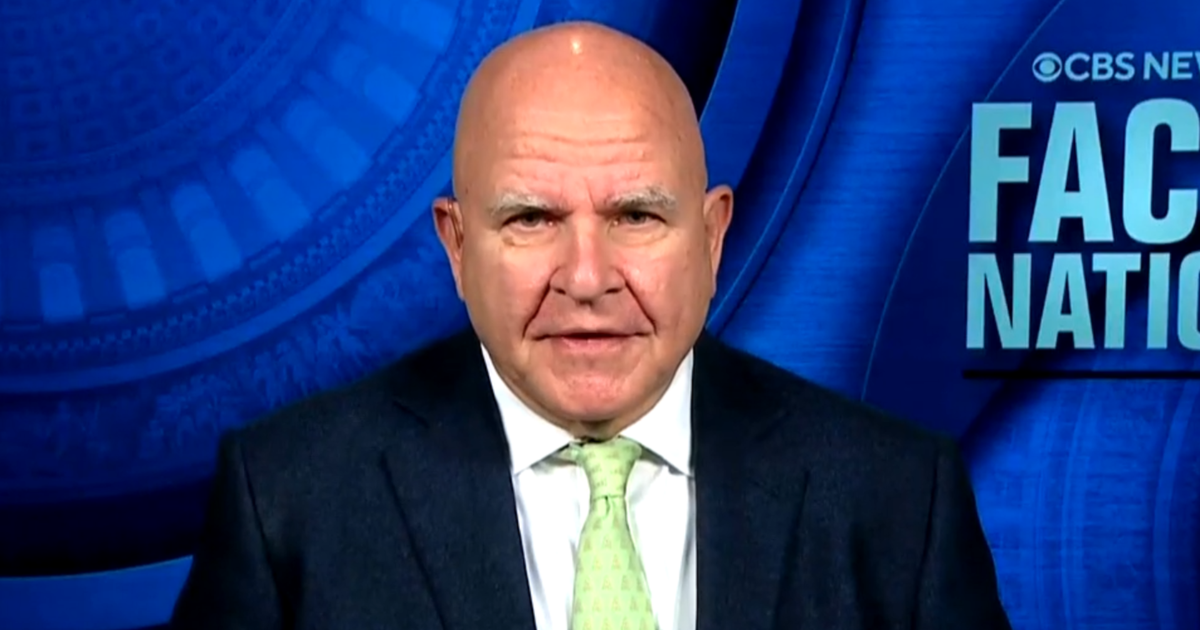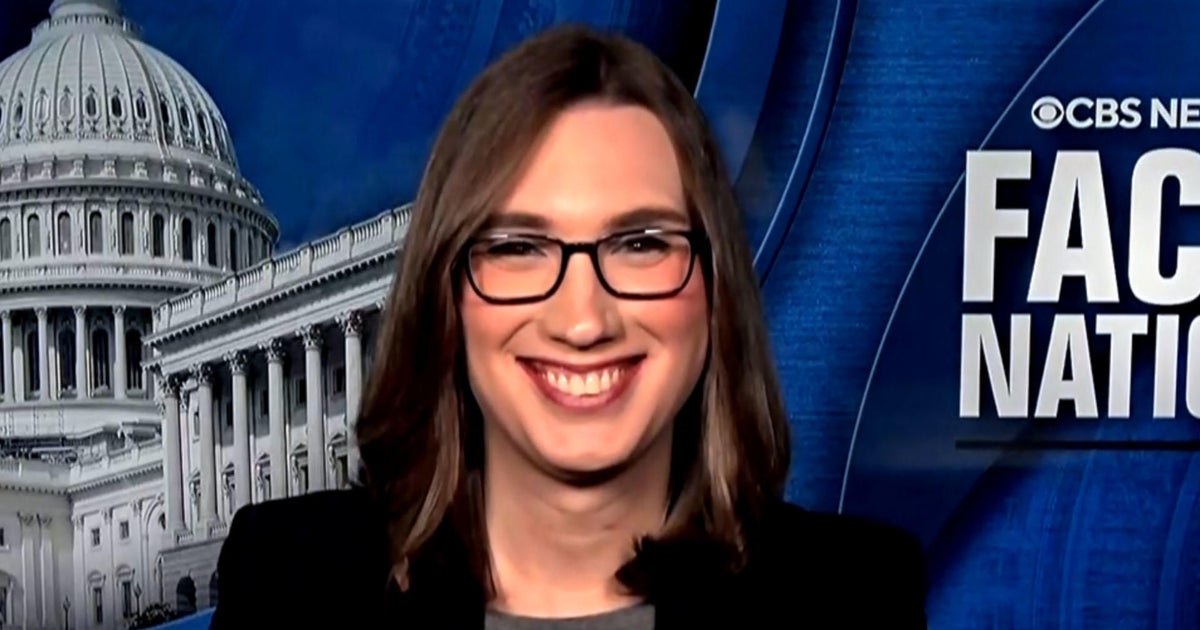CBS News
Most popular dog breed rankings are released. Many fans are not happy.

French bulldogs. U.S. dog owners. C’est l’amour.
Frenchies remained the United States’ most commonly registered purebred dogs last year, according to American Kennel Club rankings released Wednesday. The club calls the Frenchie the most popular breed, though other canine constituencies may beg to differ.
Is it a coup to be celebrated? Au contraire, say longtime fans who rue what popularity is doing to the breed. Nevertheless, after lapping Labrador retrievers to take the top spot in 2022, the bat-eared, scaled-down bulldogs held on in the new standings, which reflect puppies and other dogs that were added last year to the United States’ oldest dog registry.
“The French Bulldog’s surge in popularity shows no signs of slowing down,” said Gina DiNardo, the executive secretary at the American Kennel Club, in a statement. “Their long list of fabulous traits makes them wonderful companions for a variety of people, but that doesn’t mean they’re for everyone. It’s extremely important to do your research to not only find the right breed for your lifestyle, but to ensure that you’re getting a well-bred dog from a responsible breeder.”
Meanwhile, dachshunds are at a nearly two-decade peak, the cane corso is making moves, and there’s a new breed in the mix.
Of course, purebreds are only part of the canine population in the U.S., where animal shelters faced an influx of all sorts of dogs last year.
Here’s a snapshot of the top 10 breeds this year: After Frenchies, the most common breeds registered were Labs, golden retrievers, German shepherds and poodles. Then came dachshunds, bulldogs, beagles, Rottweilers and German shorthaired pointers.
John Minchillo / AP
All were also in the top 10 in 2022. A decade ago, Yorkshire terriers and boxers were in the group. Go back a half-century, and the third most popular breed was the Irish setter — now 76th.
Pooch preferences shift for reasons ranging from media exposure (social and otherwise) to changing lifestyles as more Americans have moved to cities.
The statistics have limits. Registration is voluntary, the AKC releases few raw numbers, and the popularity rankings measure only the club’s roughly 200 recognized breeds. They don’t include doodles, other deliberate hybrids or everyday mixed-breed dogs, though those can be registered as “all-American dogs” for such sports as agility and obedience.
Nearly 98,500 French bulldogs joined the AKC pack last year, after a whopping 108,000 in 2022.
The small, solidly built, push-faced dogs have a penchant for comically pensive expressions and often take city living in stride.
Mary Altaffer / AP
“They’re interesting little beings,” says Naneice Bucci, who has owned and shown them for decades.
The breed is now are a lightning rod for canine controversy and cultural critique.
There are the foreshortened snouts that can result in labored breathing, gagging, difficulty with exercise and other ills — concerns that prompted the Netherlands to ban breeding certain individual dogs with muzzles deemed too short. There are pet-store heists and violent robberies, at least one of them deadly. There’s a proliferation of Frenchies with unusual coat colors and textures, which have Frenchie folk squabbling over longtime standards.
And there’s concern among long-timers that the hot market for puppies is incentivizing people who are in it for greed, not the breed.
To Bucci, “it’s a very scary time.”
As a “preservation breeder” who follows AKC standards and conducts a battery of internationally recommended health tests before her dogs reproduce, she dreads that breeders who don’t do likewise may lead to crackdowns on everyone. And as a founder of Nevada French Bulldog Rescue, she also sees “all of the underbelly of the people who breed indiscriminately.”
“Every time we take in a Frenchie that’s in terrible condition, yes, I get angry,” says Bucci, who lives near Reno. “But at the same time, I don’t want to be punished for trying to do it right.”
Among other breeds, the unmistakable, low-slung dachshund is riding high at No. 6, its highest ranking since 2004. The dogs ranked as high as third at times in the 1950s-70s.
Mary Altaffer / AP
Their combination of sprightly cuteness, small size and determination — they were originally bred to roust badgers — endear them to many. They also have a full-sized bark and a tendency toward stubbornness.
“Even though they’re small, people have to remember: They are hounds,” says Carole Krivanich of Milton, Delaware, whose nearly 15-year-old dachshund Mo is an agility and show champion. A longtime Rottweiler owner, she’s found dachshunds to be “very versatile” and good companions.
The cane corso (pronounced CAH’-neh COOR’-soh) is now 16th in the rankings, remarkable for a breed the AKC first started counting as recently as 2010. (Perhaps it helped that owners have included such figures as NBA great LeBron James and Kansas City Chiefs quarterback Patrick Mahomes.)
The dogs are praised as protective, trainable and attached to their people. But the strong breed is “not for somebody that doesn’t know how to control a dog,” AKC spokesperson Brandi Hunter Munden says.
Mary Altaffer / AP
The bracco Italiano debuts in the standings at 152nd most popular. But the large, long-eared bird-hunters aren’t exactly obscure. Country music power couple Tim McGraw and Faith Hill have shared the antics of their bracchi Italiani (that’s the proper plural) on social media. A bracco co-owned by McGraw notched a first-round “best of breed” win at the prestigious Westminster Kennel Club dog show last year.
Mary Altaffer / AP
The sloughi was rarest among last year’s registrations. Sometimes called Arabian greyhounds, the fleet, somewhat shy dogs joined the AKC pack in 2016.
Bebeto Matthews / AP
While dogs from affenpinschers to Xoloitzcuintlis were bred last year, U.S. animal shelters were already brimming with dogs and cats. Shelters and rescue groups took in about 3.2 million dogs, while 2.2 million dogs were adopted, according to Shelter Animals Count, a nonprofit that gathers shelter data.
There’s “a need for a renewed effort to make adoption a priority for the community,” says the group’s executive director, Stephanie Filer. Shelters have a wide variety of dogs to offer, including specific breeds, she notes.
Hunter Munden, the AKC’s spokesperson, has two rescue dogs and a purebred herself.
“Rescue is wonderful,” she said. “However, we do understand that people want specific characteristics to fit their lifestyle, when it comes to dog ownership, and that’s where purebred dogs come in.”
CBS News
Former Trump national security adviser says next couple months are “really critical” for Ukraine

Washington — Lt. Gen. H.R. McMaster, a former national security adviser to Donald Trump, said Sunday that the upcoming months will be “really critical” in determining the “next phase” of the war in Ukraine as the president-elect is expected to work to force a negotiated settlement when he enters office.
McMaster, a CBS News contributor, said on “Face the Nation with Margaret Brennan” that Russia and Ukraine are both incentivized to make “as many gains on the battlefield as they can before the new Trump administration comes in” as the two countries seek leverage in negotiations.
With an eye toward strengthening Ukraine’s standing before President-elect Donald Trump returns to office in the new year, the Biden administration agreed in recent days to provide anti-personnel land mines for use, while lifting restrictions on Ukraine’s use of U.S.-made longer range missiles to strike within Russian territory. The moves come as Ukraine marked more than 1,000 days since Russia’s invasion in February 2022.
Meanwhile, many of Trump’s key selection for top posts in his administration — Rep. Mike Waltz for national security adviser and Sens. Marco Rubio for secretary of state and JD Vance for Vice President — haven’t been supportive of providing continued assistance to Ukraine, or have advocated for a negotiated end to the war.
CBS News
McMaster said the dynamic is “a real problem” and delivers a “psychological blow to the Ukrainians.”
“Ukrainians are struggling to generate the manpower that they need and to sustain their defensive efforts, and it’s important that they get the weapons they need and the training that they need, but also they have to have the confidence that they can prevail,” he said. “And any sort of messages that we might reduce our aid are quite damaging to them from a moral perspective.”
McMaster said he’s hopeful that Trump’s picks, and the president-elect himself, will “begin to see the quite obvious connections between the war in Ukraine and this axis of aggressors that are doing everything they can to tear down the existing international order.” He cited the North Korean soldiers fighting on European soil in the first major war in Europe since World War II, the efforts China is taking to “sustain Russia’s war-making machine,” and the drones and missiles Iran has provided as part of the broader picture.
“So I think what’s happened is so many people have taken such a myopic view of Ukraine, and they’ve misunderstood Putin’s intentions and how consequential the war is to our interests across the world,” McMaster said.
On Trump’s selections for top national security and defense posts, McMaster stressed the importance of the Senate’s advice and consent role in making sure “the best people are in those positions.”
McMaster outlined that based on his experience, Trump listens to advice and learns from those around him. And he argued that the nominees for director of national intelligence and defense secretary should be asked key questions like how they will “reconcile peace through strength,” and what they think “motivates, drives and constrains” Russian President Vladimir Putin.
Trump has tapped former Rep. Tulsi Gabbard to be director of national intelligence, who has been criticized for her views on Russia and other U.S. adversaries. McMaster said Sunday that Gabbard has a “fundamental misunderstanding” about what motivates Putin.
More broadly, McMaster said he “can’t understand” the Republicans who “tend to parrot Vladimir Putin’s talking points,” saying “they’ve got to disabuse themselves of this strange affection for Vladimir Putin.”
Meanwhile, when asked about Trump’s recent selection of Sebastian Gorka as senior director for counterterrorism and deputy assistant to the president, McMaster said he doesn’t think Gorka is a good person to advise the president-elect on national security. But he noted that “the president, others who are working with him, will probably determine that pretty quickly.”
CBS News
Sen. Van Hollen says Biden is “not fully complying with American law” on Israeli arms shipments

Watch CBS News
Be the first to know
Get browser notifications for breaking news, live events, and exclusive reporting.
CBS News
Rep.-elect Sarah McBride says “I didn’t run” for Congrees “to talk about what bathroom I use”

Watch CBS News
Be the first to know
Get browser notifications for breaking news, live events, and exclusive reporting.
















